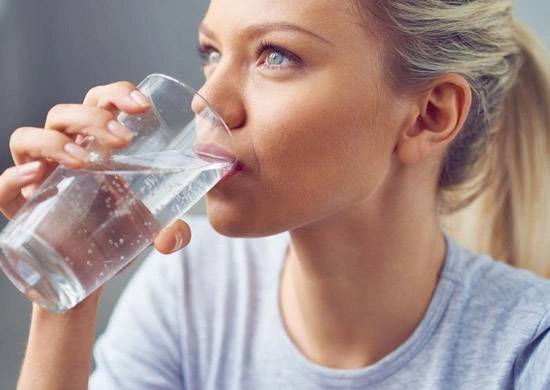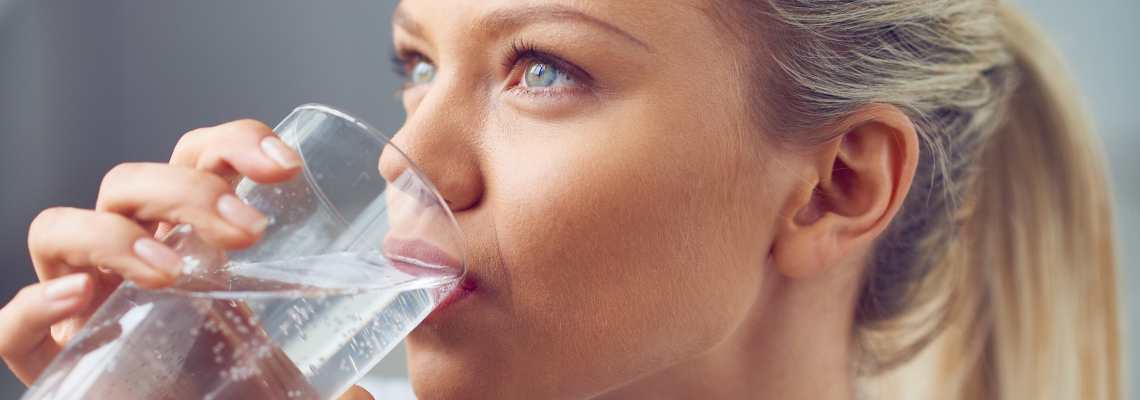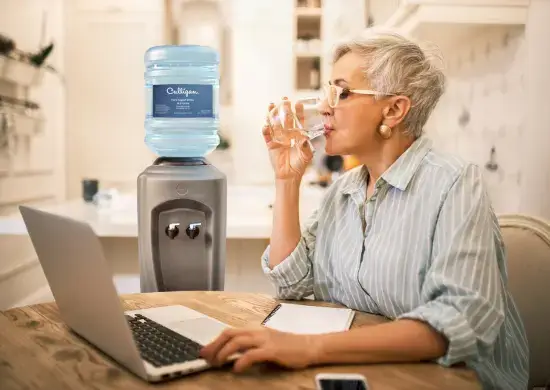

We can all relate: After a long day at work, rushing around grocery shopping or pursuing a hobby, sometimes remembering to drink enough water isn’t at the forefront of our minds. But what happens if you don’t drink enough water? What differentiates severe or mild dehydration and normal thirst, and are there ways of preventing them?
We’re here to tell you important information about the signs of dehydration and how important it is to stay hydrated and how it can prevent unpleasant side effects.

What is Dehydration?
Dehydration is the result of losing more water than you drink. For example, picture an athlete exercising in the heat: their body temperature is elevated, resulting in fluid loss via sweat. If they don’t replenish and drink fluids, their bodily functions may begin to suffer.
Here are some common ways that we come into contact with water that can affect our skin and what the effects may be:
What Causes Dehydration?
Dehydration can occur if you’re affected by a few things, such as:
- Illnesses that induce increased sweating, diarrhoea or vomiting
- Strenuous exercise
- Prolonged exposure to high temperatures and hot weather
- Some medications
These issues can cause your body to lose more fluid. Regardless of what causes the dehydration, there is something that all the cases have in common: the person’s fluid intake is not enough to replace the lost water.

Can Anyone Experience Dehydration?
Yes, anybody can find themselves dehydrated. Despite reports that dehydration is not as common as the media suggests, it is still an issue that many people experience, including:
- Young Children
- Elder Adults
- Athletes
- People with medical conditions
- Those in hotter climates
Hospital admissions are frequently due to dehydration, especially as it can aggravate pre-existing medical conditions, particularly in older adults. That being said, regardless of age, everybody should know about dehydration prevention, particularly in relation to themselves, but also for their loved ones and even their pets.
Dehydration Symptoms
The symptoms of not drinking enough water can vary depending on someone’s overall health and age, as well as the severity of the dehydration. Here are some key symptoms to keep an eye out for:
- Fatigue
- Increased heart rate
- Dry skin
- Dizziness
- Confusion
- Rapid breathing

Dehydration vs. Heat Stroke
Though heat stroke and dehydration are different conditions, they are still closely related, so much so that they share some similar symptoms. Dehydration can often lead to other heat-related illnesses like heat stroke as the body cannot produce enough sweat to cool down, resulting in dizziness, headaches, increased heart rate, and in severe cases, even hallucination.
Tips for Preventing Dehydration
Even if you’re not at high risk of dehydration, it is still important to be aware of how to prevent it.
Here are a few tips you should keep in mind:
- Be aware of how much water your body needs: Are you aware of how much water you need to drink a day? The amount is determined by a multitude of things such as your activity level and health. However, the general rule of thumb is about 3.7litres for men and 2.7litres for women.
- Don’t rely on sugary drinks for your water intake: Most of us may enjoy a sugary drink as a treat, but we should not rely on it as a form of hydration. In fact, research shows that soft drinks can worsen the effects of dehydration. Other drinks, like sports drinks, may also not be good for you. If you’re feeling thirsty, it’s best to stick to water.
- Be mindful of the weather: Even if you’re just relaxing in the hot weather, you will likely be sweating more, causing you to lose a lot more fluid. The hotter it is, the larger amounts of water you need to consume to prevent dehydration.
- Keep your refillable water bottle on you: No matter what you’re doing, if you’re just popping to the shop or going for a walk, it’s important to take enough water with you to keep you hydrated,
- Replenish your fluids if you’re sick: Suffering from vomiting and diarrhoea can cause dehydration, so it’s important to replenish the fluid loss if you’re sick. If you’re not feeling well, keep water and hydrating food to hand.
- Be aware of what to look for: It’s key to be aware of what occurs when you’re experiencing dehydration. Knowing what to keep an eye on will allow you to correct the issue and rectify your lack of water. If the symptoms are advanced, you’ll know when it’s a good time to contact the doctor.

The Key to Drinking Enough Water
One of the best ways to prevent dehydration that we did not include in the above list is actually drinking enough water. However, that can often be easier said than done, particularly if your tap water doesn’t taste great and you’re concerned about contaminants in it, and don’t have access to fresh, filtered water.
Unfortunately, only having access to water that you don’t trust can lead to dehydration, indirectly, as you’ll be less likely to pour a glass of water if you’re concerned about its quality, causing you to not get the fluid you need.
If you’re in doubt about your water quality, a water softener or a water filtration system can greatly help you. You can look at investing in a bottled water cooler, ensuring your water is always filtered, fresh and chilled. Cheaper, in the long run, a mains-fed water cooler draws water from your mains, filters it and chills it, providing you with fresh, trustworthy water.
While drinking water is crucial, it’s not the only source of hydration. The water we get from the food we eat plays a significant role as well. Fruits and vegetables, such as watermelon and cucumber, have high water content and provide clean water infused with essential nutrients and minerals. Incorporating these water-rich foods into our diet is beneficial. It’s best to maintain a well-balanced diet that includes water-rich fruits and vegetables. Prioritising both food and water intake ensures proper hydration for optimal health.
Prevent Dehydration by Taking Control of Your Water Quality
There’s a lot to know about dehydration like the causes, symptoms and solutions. You may not be at risk, in particular, but it is still important to understand more about dehydration and how to avoid it.
Related articles


